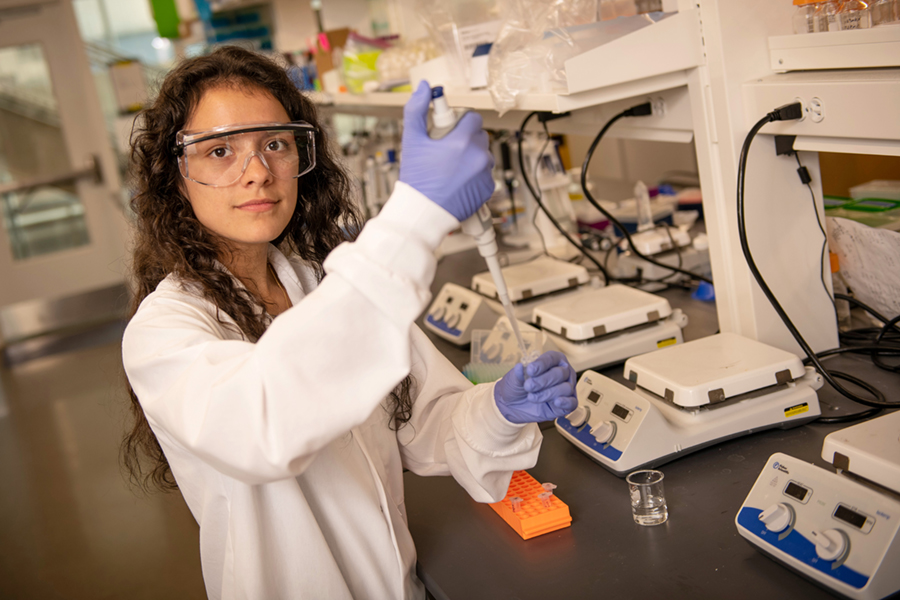
A Quest for Knowledge and Innovation
An undergraduate research fellowship enriches Isabelle Chickanosky’s education — and helps her unlock the medical possibilities of silk
By Sarah Burke
When you think of silk, you may picture chic scarves and luxurious dresses. But for Isabelle Chickanosky, a junior studying materials science and biomedical engineering, silk has the potential to revolutionize health care.
With support from a summer undergraduate research fellowship, Isabelle is exploring how ultrasound can be used to break down silk capsules and release drugs slowly over time. Because the immune system does not attack silk as a threat, it has enormous promise as a coating to deliver drugs to specific parts of the body. The potential result is less invasive treatment and fewer side effects for patients — a true game-changer for medicine.
“Research gives me the chance to learn something new every day,” Isabelle says.
Last academic year, 204 undergraduate research projects like Isabelle’s received $436,315 in grants, summer fellowships and international fellowships from CMU’s Undergraduate Research Office. Support from CMU donors helps make these awards possible.
“Undergraduate research is so important because it inspires the next generation of researchers,” says Professor Rosalyn Abbott, head of CMU’s Abbott Lab where Isabelle works. “Getting your hands dirty is the best way to decide if you want to pursue a career at the forefront of science.”
Professor Abbott says that undergraduates like Isabelle bring enthusiasm and fresh perspectives to her lab, and she enjoys watching her student researchers learn and grow.
“Coming to CMU, I didn’t really know what doing research meant, but I knew I wanted to try it,” Isabelle says, “I feel so blessed that it’s possible for me to work with amazing mentors like Professor Abbott who love sharing their passion with students.”
Isabelle hopes to become a professor herself someday, and this undergraduate research fellowship has offered her rich professional development opportunities and a better understanding of research as a process and a career path.
“Isabelle is passionate about everything she does,” Professor Abbott says. “She works hard and asks lots of questions. In the lab, I've watched her gain confidence and independence in seeking her own answers and troubleshooting.”
Lab work has been just one aspect of Isabelle’s experience. She says one of the most exciting parts of her day is reading articles about new discoveries being made by other researchers — both within her field and far beyond it.
When Isabelle had surgery last spring, she realized just how insatiable her thirst for knowledge had become: “When I woke up from the anesthesia, the first thing I said was, ‘Mom, can you hand me my articles?’”
Her mother’s response? “Isabelle Katherine, you are such a nerd!”
That keen sense of curiosity is what continues to drive Isabelle as a researcher — and it’s one of her favorite things about CMU culture.
“I have the most amazing conversations here about what everyone is learning,” she says. “I love being exposed to all these new topics and ideas every day at CMU.”